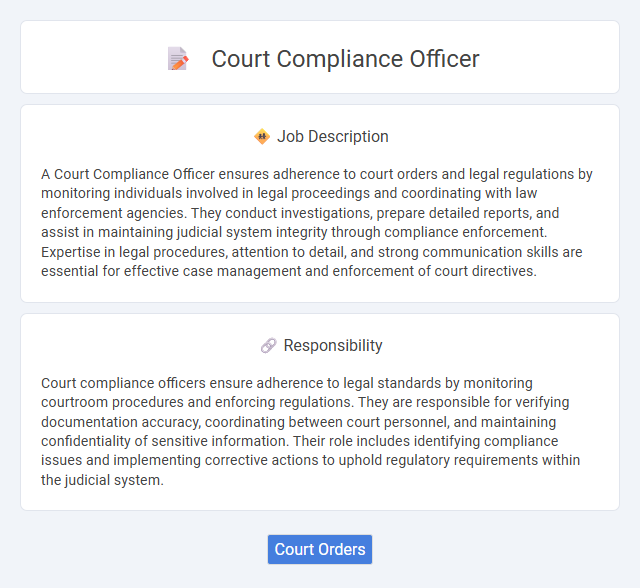
A Court Compliance Officer ensures adherence to court orders and legal regulations by monitoring individuals involved in legal proceedings and coordinating with law enforcement agencies. They conduct investigations, prepare detailed reports, and assist in maintaining judicial system integrity through compliance enforcement. Expertise in legal procedures, attention to detail, and strong communication skills are essential for effective case management and enforcement of court directives.
Individuals with strong organizational skills and an eye for detail are likely suitable for a Court Compliance Officer role, as the job demands meticulous record-keeping and adherence to legal regulations. Those who thrive under structured environments and can manage sensitive information confidentially probably fit well with the responsibilities involved. People who struggle with high-pressure situations or lack patience for procedural work may find this occupation challenging.
Qualification
Court compliance officers typically require a bachelor's degree in criminal justice, law, or a related field, combined with experience in legal or regulatory environments. Certification such as Certified Compliance and Ethics Professional (CCEP) enhances job prospects and demonstrates expertise in maintaining court regulations. Strong knowledge of judicial procedures, attention to detail, and proficiency in legal documentation are essential qualifications for this role.
Responsibility
Court compliance officers ensure adherence to legal standards by monitoring courtroom procedures and enforcing regulations. They are responsible for verifying documentation accuracy, coordinating between court personnel, and maintaining confidentiality of sensitive information. Their role includes identifying compliance issues and implementing corrective actions to uphold regulatory requirements within the judicial system.
Benefit
Court compliance officer roles likely offer benefits such as enhanced job stability due to the essential nature of legal system support. Employees probably receive opportunities for professional development and expertise in regulatory frameworks. Compensation packages may include competitive salaries and possible government-related perks, increasing the overall appeal of the position.
Challenge
A Court Compliance Officer will likely face the challenge of ensuring strict adherence to complex legal regulations while managing diverse cases simultaneously. Maintaining up-to-date knowledge of evolving laws and court procedures can increase the probability of encountering unexpected compliance issues. The role may also involve balancing enforcement duties with the need for effective communication among judges, attorneys, and defendants.
Career Advancement
Court compliance officers play a crucial role in ensuring adherence to legal and regulatory standards within judicial systems. Career advancement opportunities often include promotions to supervisory roles, such as senior compliance officer or court administrator, which involve managing teams and overseeing complex compliance strategies. Gaining specialized certifications and further education in law or criminal justice significantly enhances prospects for higher-level positions and increased responsibilities.
Key Terms
Court Orders
Court compliance officers ensure that court orders are followed accurately and promptly, monitoring individuals and organizations to verify adherence to legal mandates. They gather evidence, report violations, and collaborate with law enforcement agencies to enforce compliance with judicial rulings. Their role is critical in upholding the authority of court orders and maintaining the integrity of the legal system.
 kuljobs.com
kuljobs.com